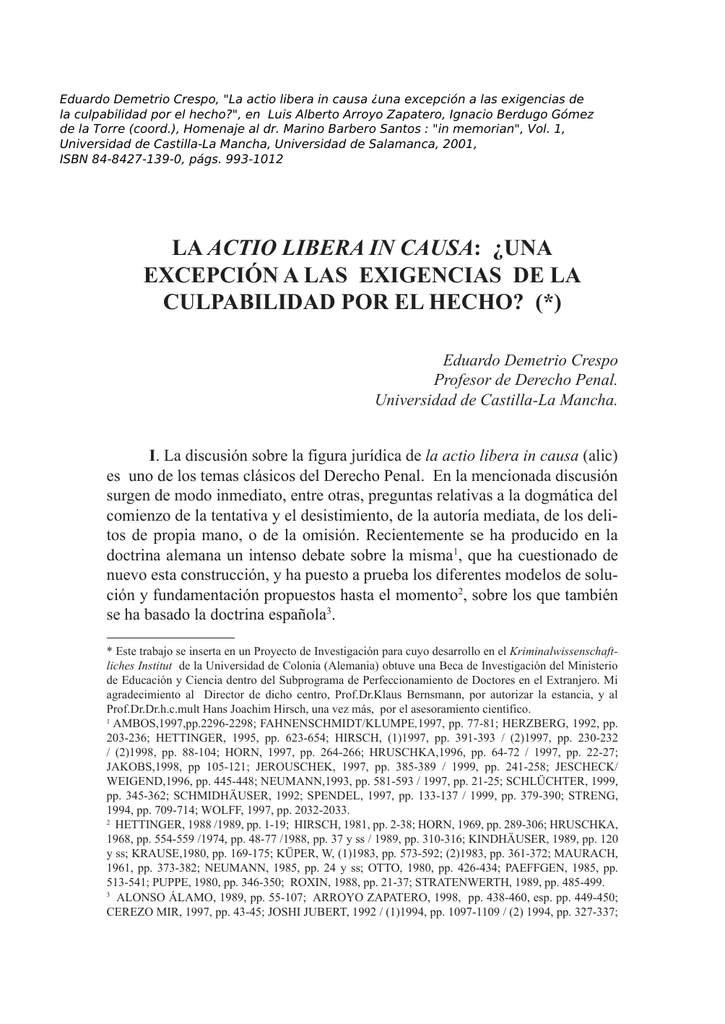

On the other hand, it disallows defendants to appeal to defences they would otherwise be entitled to use to block liability, if they culpably created the conditions of their own defence. On the one hand, the actio libera doctrine allows us to waive the voluntariness requirement that is generally needed for criminal liability. But I argue that we must distinguish between two importantly different understandings of the doctrine itself and its application in law. Aun cuando al momento del suceso no pueda. This doctrine seems to be instantiated in a great many actual legal practices. La actio libera in causa es una accin cuya causa decisiva fue puesta por el autor en condicin de libertad e imputabilidad, pero que en cuanto al resultado tpico opera en un momento en que el autor es incapaz de culpabilidad, cayendo a un estado de inimputabilidad absoluta. The actio libera doctrine allows us to impute unfree actions to persons, provided they were responsible for causing the conditions of unfreedom that characterizes those actions when performed.
#ACTIO LIBERA IN CAUSA EJEMPLOS FREE#
Like our Enlightenment counterparts, contemporary philosophers of criminal law, as well as most Western legal systems (both common law and civil), allow that persons can be responsible for acts that are not free when performed, provided they were free in their causes. The actio libera in causa doctrine, as originally formulated by various Enlightenment philosophers, concerns the imputation of responsibility to actors for actions unfree in themselves, but free in their causes. Actio Libera in Causa Actio Libera in Causa The review on the article is available at. Therefore, the findings suggest a balancing between these interests and propose a way to achieve this compromise. The examination reveals that two contradictory interests-the need to safeguard personal freedom and the need to combat lawful, yet socially harmful, acts through judicial punishment-cannot be completely ignored in practice. To determine the correct approach to nulla poena sine lege, the paper considers its history in continental criminal law and then analyses the principle theoretically. They argue that the maxim, while prohibiting judges from punishing non-criminal acts, makes it impossible for courts to deter them in a timely manner, which, in certain cases, may have a detrimental effect on society.

However, its critics assert that rigid adherence to the principle nulla poena sine lege may do more harm than good. Some scholars advocate the inviolability of this maxim because it safeguards personal freedom-an opportunity to do everything not prohibited by law. Asi, por ejemplo, en la sentencia 22,413 del Reichsgericht, con la que la oactio libera in causa se introduce en la jurisprudencia. This is a collection of original essays on the topic of actio libera in causa and its relations to other areas of substantive criminal law and doctrines in the generalĪbstract Multiple viewpoints have been expressed regarding the principle nulla poena sine lege (there exists no punishment without a pre-existing penal law). The first case involves rules of imputation, while the second concerns culpability, and justifying the actio libera doctrine therefore faces different challenges in the two cases. This doctrine seems to be instantiated in a great many actual legal practices. C.17a - Entre la ausencia de accin y de culpabilidad. C.16b - Movimientos reflejos, fuerza irresistible. C.14 - Ausencia de accin C.15 - Actio libera in causa y ausencia de accin. Like our Enlightenment counterparts, contemporary philosophers of criminal law, as well as most Western legal systems (both common law and civil), allow that persons can be responsible for acts that are not free when performed, provided they were free in their causes. C.13 - Inconsciencia y actio libera in (sua) causa.



 0 kommentar(er)
0 kommentar(er)
